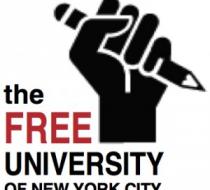Free University New York City 1 Favorite
If you headed into the West 4th St. Subway Station on March 9, 2014, you may have seen a group of people writing on cardboard, taping it to the walls, and seemingly holding a small class in the underground space. Those were some of the members of Free University NYC, a radical educational project started during May 2012 as a form of educational strike. They hold classes in public spaces like parks and subway stations, and are entirely free. They often have things like food and childcare set up at their events to make them more accessible to the public.
As they say on their website, Free University NYC is “an attempt to create education as it should be.” As tuition prices and student debt payments rise, the realization that education should not be a commodity makes their actions more and more important. In addition to fighting the oppression of the education-for-pay system, their classes are also modeled on an anti-oppression horizontal model reminiscent of Paolo Freire’s “Pedagogy of the Oppressed”. They also actively fight racism, which is rampant in the rest of the education system.
Nearly anyone who has something to share can teach a Free University class. They often put out an open call for submissions before their events, and then schedule what people seem to be the most excited about. They often schedule their largest gatherings around other momentous occasions, possibly stemming from the fact that they were created as a part of a May Day strike. Some of their most notable convergences include September 18-22 2012, the first anniversary of Occupy Wall St., and a session in Spring 2013 outside the occupied Cooper Union.
Free University NYC is a successful exercise in prefigurative living that furthers the political education and community-building of activists and non-activists alike in New York City. It empowers people to take their education into their own hands, and it’s free-ness provides a harsh contrast with the cost of other schools that causes participants to question whether or not anyone should really be paying for an education.







